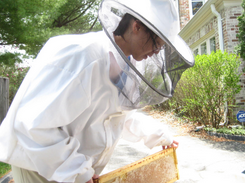Featured Beekeeper: Julia
 What initially sparked your interest in keeping bees?
What initially sparked your interest in keeping bees?
The desire to continue my daughter’s hobby and curiosity as well as the observation hives that we see at the state fair and nature centers, and of course, Ms. Frizzle and the Magic School Bus sparked the interest.
Did you have any hesitations before getting your first hive?
No, because I felt prepared. My daughter was assigned to a mentor and had taken a beginning beekeeping class and kept the textbook. I was nervous to work the bees alone, but curiosity overtook my nerves.
Were your neighbors instantly onboard with the idea, or did you have to convince them?
We did not give our neighbors a choice, because the hive is on our property. Additionally, with a six foot fence behind the hive, the bees’ flight pattern is up and over our heads. The one neighbor had nostalgic boyhood honey bee memories, which made him a big supporter. Another neighbor had concerns when he blew out the pipes of his swimming pool or had puddles of pool water on his deck, but overall supports bees. A new neighbor is new to home owning, gardening, and yard work, and of course, the benefits that honey bees bring to a yard. For the hives that I keep on other people’s land, everyone has been welcoming. In fact, their neighbors come over to watch during my visits.
What kind of work do you have to do to upkeep your beehive?
A beehive is made of boxes full of frames. The frames are where the bees make their comb and where they live. I inspect frames to ensure healthy, productive queens; monitor overall health; give space for growth, brood rearing, and food storage; and to prevent swarming.
How does the honey harvesting process work? How much honey do you usually get and what do you do with it?
Honey is typically harvested by removing frames that are full of capped honeycomb. If the honey has a low moisture content, the combs are uncapped and honey is removed by spinning the combs in an extractor, or special centrifuge. Some people produce comb honey, in which honeycomb is removed from the frame without extracting. Since we haven’t had regular weather patterns, there is no ‘usually getting’ any amount – in fact, I feel like Mother Nature owes us another month of warm summer weather this year! Honey bee health also contributes to harvest. In Iowa, I reserve honey for the bees to consume during winter. Some hives have no surplus to harvest because of this; other hives produce many pounds of surplus.
Do you grow food or other plants as well? If so, do the bees affect your output at all?
I keep a home garden of food and landscaping plants. I have hives on someone else’s property, and his raspberry yield was great this year (after 7 years of small harvests); bees definitely boosted our home’s strawberry harvest (see my story).
What has been your greatest challenge in your beekeeping endeavors?
The greatest challenge to beekeeping is ignorance. There are people who think that every stinging bug is a honey bee, who want me to save bees from their house when they really have wasps, who hate having bees on their flowers for fear of their neighbor’s kid or dog being stung during a friendly visit, etc.
What do you enjoy the most about beekeeping?
I love meeting new people. I also get a rush in saving and relocating bees from fallen, storm damaged trees.
Why do you think keeping bees is important?
Gardens and bees benefit from each other’s presence. If we want successful gardens, we need pollinators. Native pollinators and their habitats are declining, which makes keeping urban bees more important.
Do you think this is a growing movement? Should other people think about getting beehives?
Urban beekeeping has certainly grown in my area. Demand for beginning beekeeping classes remains high. We’ve moved from a small email group to a Facebook group of over 150 people; roughly half of the membership is made of prospective beekeepers. Yes, everyone should think about getting bee hives.
Do you have any advice for first-time beekeepers?
Find a local support group and an experienced mentor who has had success in overwintering bees under his or her belt.







